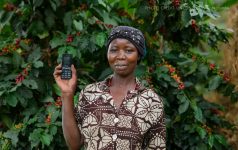Dalberg uses cookies and related technologies to improve the way the site functions. A cookie is a text file that is stored on your device. We use these text files for functionality such as to analyze our traffic or to personalize content. You can easily control how we use cookies on your device by adjusting the settings below, and you may also change those settings at any time by visiting our privacy policy page.
We are launching a new and innovative Big Data platform in Uganda with UNCDF and Dalberg Data Insight. This will allow public authorities in the country to take better decisions and make stronger assessments. Think of using social media data to strengthen disaster response or telecom data to enrich national statistics as a solid basis for human-centred policymaking. It is the first step of building a local data ecosystem, the beginning of a larger scale-up across emerging countries. We want to give the value of the data back to the people.”
-Alexander De Croo, Deputy Prime Minister of Belgium
Dalberg Data Insights is launching AIDA in Uganda, the Action Insights Data platform, which was developed in partnership with the United Nations Capital Development Fund (UNCDF) and the Belgian Government. The goal is, first, to accelerate the use of private and public data sources and, second, to create an entire data ecosystem for the country, while complying to regulations and ensuring privacy.
With the advancement and use of new technologies, people leave behind a daily digital footprint. These traces are known as “Big Data”. Most of these data are collected by private corporations such as Mobile Network Operators (MNOs), financial service providers, tech giants, etc. Such data can provide a vast set of insights, being granular, real-time and covering large portions of the population. Leading companies already leverage their own data to become more efficient and user-centric by improving customer experience and making data-driven investments.
However, privately held data (e.g. telecom, financial transactions), social media data, data from sensors, and satellite data can also be used to address social questions and needs to improve and even transform policy making, disaster response and national statistics reporting. This is especially important in countries where traditional data collecting methods are very expensive and do not happen regularly. In fact, while large data sources independently provide invaluable and highly granular insights in near real-time, the true value of the data comes from combining multiple data sources–such as traditional data from census or surveys–with big data sources–such as telecom, banking, satellite imagery. Such fusion strengthens insights, predictions and modeling, which, in turn increasingly build trust among the international development community.
AIDA is a data platform that enables the integration, anonymization and aggregation of different data sources for the development of data products, such as dashboards, algorithms, aggregates and data sheets. These data products provide real-time, actionable insights that can guide policy making, disaster response, program management and impact assessment for better development outcomes and can be used by the development community in combination with other data, algorithms or dashboards. Data privacy is strictly respected and no individual data is shared. Our approach uses traditional aggregation techniques and more advanced machine learning and artificial intelligence techniques. The data products not only provide important insights into the current situation, but can further track changes in real-time and predict what will happen in the future.
AIDA was tested in Uganda where Dalberg Data Insights has built four data products in the form of algorithms and dashboards using big data, censuses, and surveys. The data products were co-designed and tested with Hunger Fighters Uganda, UNCDF MM4P, ROM Transportation Engineering and Kampala Capital City Authority (KCCA). The dashboards support data-driven decisions about food security, financial inclusion and urban planning.
The launch of AIDA is only the starting point for Dalberg Data Insights and UNCDF to develop a digital ecosystem in Uganda. Dalberg Data Insights will further develop the current data product offering, while integrating additional data sources. We welcome local data experts and tech startups to build new algorithms and leverage the insights from the data to demonstrate the potential and real impact of actionable insights for better development results.
Learn more about AIDA.








